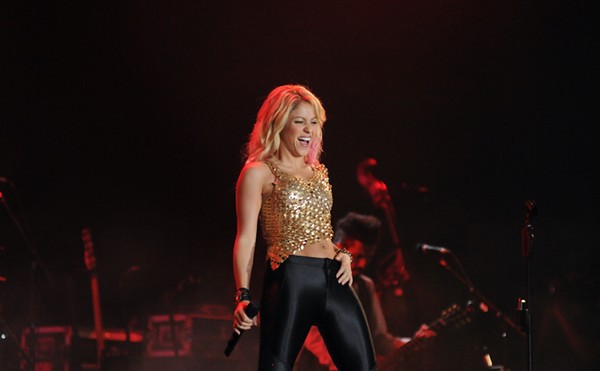Magic
Bruce Springsteen
(Columbia)
Bruce Springsteen hasn’t made a carefree record since 1973’s The Wild, The Innocent & The E Street Shuffle, and even that one had a few ominous shadows. Everything since then has been about that ever-present darkness on the edge of town: either battling it (The River), losing your identity and moral center to it (Nebraska), or bravely transcending it (The
Rising).
Over the last 20 years, Springsteen has become a tighter, more precise lyric writer, moving away from the earnest, overheated imagery of his early work in favor of short-story nuance. Unfortunately, the life-or-death spirit that went with that earnest streak — and rocked up his most dour meditations — disappeared. Even when he periodically turned to his old foils, the E Street Band, the results felt like the even-tempered, smoothly crafted work of a middle-aged solo
artist.
That’s what makes Magic such a bracing return to glory. It has the garage-band fervor of The River, amplified by a higher level of literary sophistication, and abetted by Springsteen’s rare willingness to let his jangle-pop flag fly. “Girls in Their Summer Clothes” is wishful California melodicism, while “Your Own Worst Enemy” has the baroque feel of the Left Banke, with spacious “Bells of Rhymney” harmonies and Springsteen crooning in a register so high (at least near the end), you wonder for a second if it’s really him.
Like many of the songs on this album, “Your Own Worst Enemy” could be about a foolish ex-lover or a foolish president of the United States, and it works either way. Tracks like “Radio Nowhere” and “Last to Die” (the most explicit anti-war song here) achieve a Social Distortion-level of thickness, and for the first time you can really hear that this is a band with four guitarists.
Some people will always prefer Springsteen’s grim alienation served cold, as on Nebraska and The Ghost of Tom Joad, but this album reminds us what the E Street Band brings to the table. Their sonic might enables Springsteen to confront the world, even when he’s busy dissecting his own sadness.
— Gilbert Garcia
Once Upon a Time in the West
Hard-Fi
(WEA)
For Hard-Fi’s sophomore release, the band opted to leave their cover art blank, just a yellow slate except for their name, the title (Once Upon a Time in the West) and, in giant letters, the words “No Cover Art.”
According to frontman Richard Archer, this was an attempt to rebel against the diminishing importance of album art in an era of growing digital downloading. Another way to put it: Hard-Fi tried really hard to look as punk as their idols, the Clash, but only managed to look, well, kind of like wannabes. They’re catching a lot of flak for this, along with the fact that, like their debut, The Stars of SCTV, Once is about being lost in Britain’s working-class suburbia despite the fact that, after Stars, the members of Hard-Fi aren’t exactly “skint” anymore.
The truth is that, yeah, Hard-Fi has made a couple of missteps with Once, particularly with how it’s been marketed, but, at the end of the day, these lads from Staines are obviously scarred by the life they lived until just a few years ago, and you can’t exactly blame them for singing about what they know.
Take the first track, “Suburban Knights”: With its synths and dub-rock, not to mention its lyrics, it’s a natural transition from Stars, but, like the rest of the album, it’s bigger, more layered, than anything on the debut album. In other words, Once shows Hard-Fi yearning to fill arenas. “We Need Love,” “Can’t Get Along,” and especially “Television,” with its infectious chants — a Hard-Fi staple — are further evidence of this, drawing upon everything from the Jam to vintage Motown. But for all of the follow-up’s swagger and blustery grandness, the most unforgettable track remains “Help Me, Please,” written by the otherwise-average lyricist Archer about the death of his mother.
— Cole Haddon
















